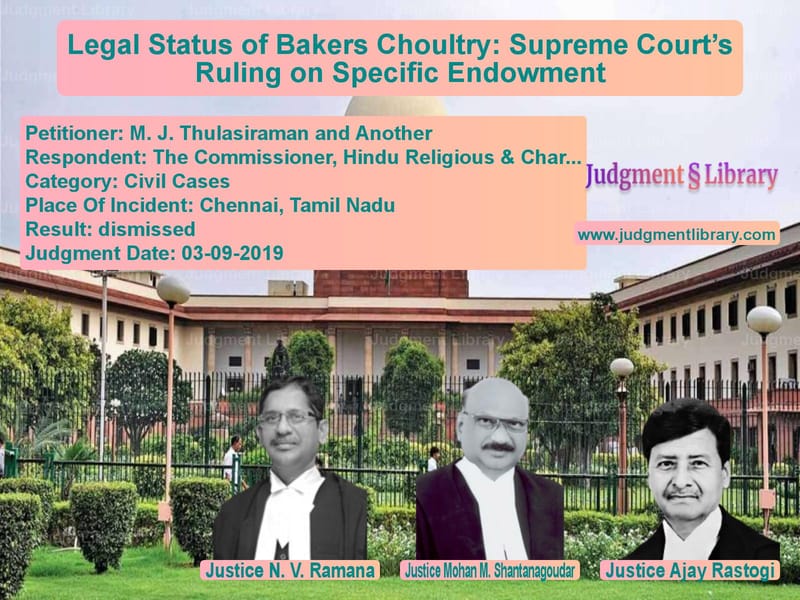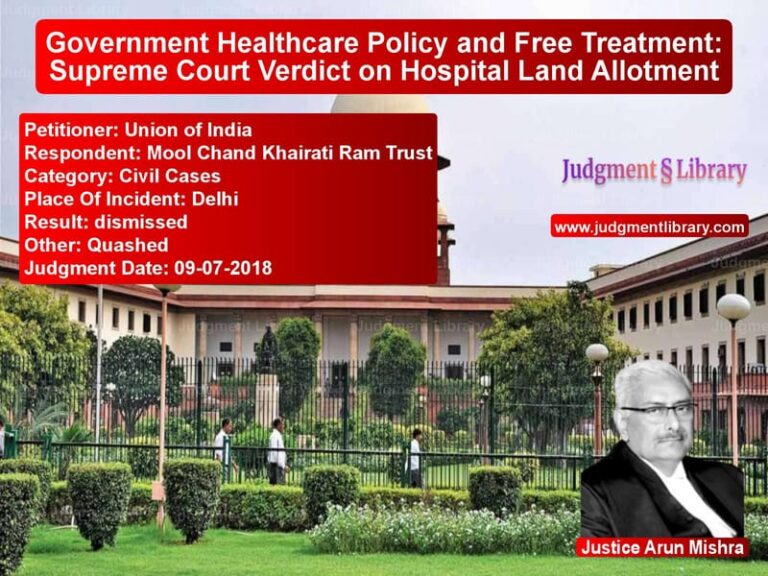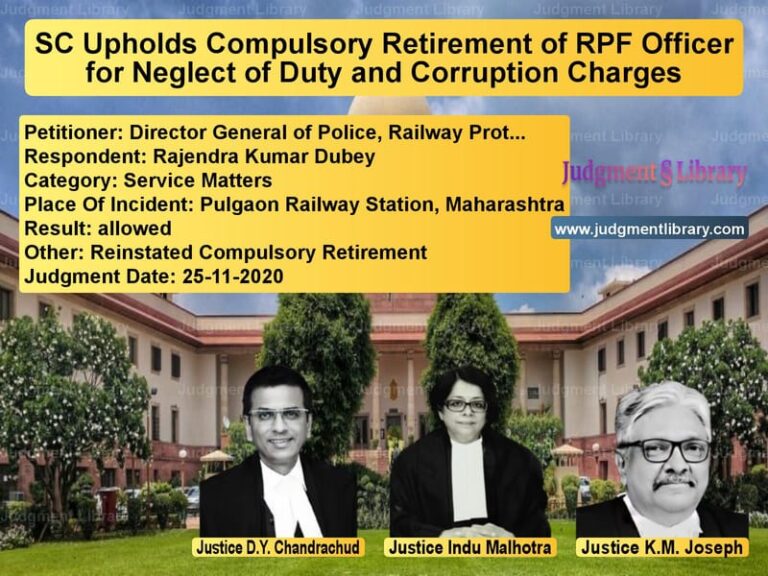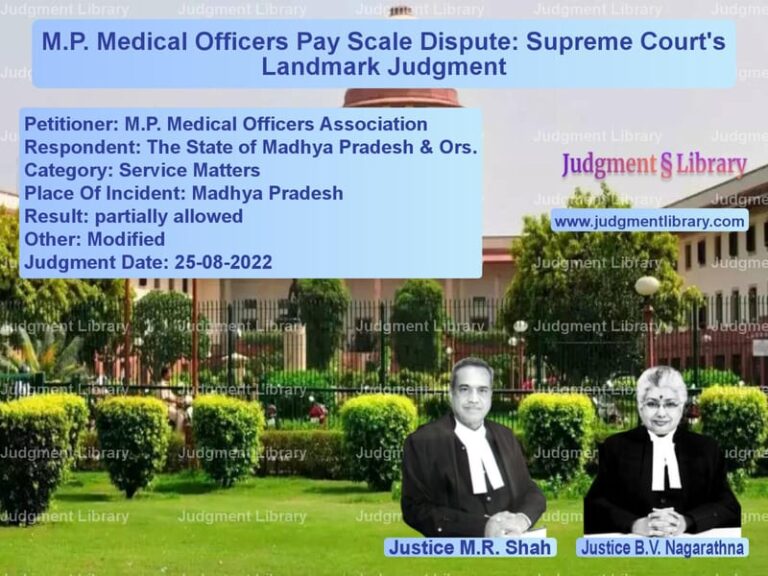Legal Status of Bakers Choultry: Supreme Court’s Ruling on Specific Endowment
The Supreme Court of India recently decided a crucial case regarding the legal status of the ‘Bakers Choultry,’ a property in Chennai, under the Tamil Nadu Hindu Religious and Charitable Endowments Act, 1959. The case revolved around whether the choultry constituted a specific endowment, thus falling under the Act, or whether it was the private property of the appellants.
The appellants, M. J. Thulasiraman and another, challenged the decision of the High Court of Madras, which upheld the findings of the Hindu Religious and Charitable Endowments (HR & CE) Department that the choultry was a specific endowment. The respondents, led by the Commissioner of HR & CE, contended that the property was intended for religious charitable purposes, particularly the feeding of Brahmins and the poor during Hindu festivals.
Background of the Case
The dispute dates back to 1987, when the appellants’ predecessor-in-interest filed an application seeking a declaration that ‘Bakers Choultry’ was private property. The Deputy Commissioner and the Commissioner of HR & CE rejected the claim, ruling that the choultry was a specific endowment. The appellants challenged these orders in civil court, but their case was dismissed. The High Court later upheld the decision, leading to the present appeal before the Supreme Court.
Arguments of the Appellants
The appellants, represented by their legal counsel, argued:
- The rock inscription inside the choultry was vague and did not explicitly create a specific endowment.
- The inscription did not lead to any divestment of ownership.
- The property was privately owned, with only a general duty to perform charity, which does not constitute a legal endowment.
- Reliance was placed on past High Court rulings that emphasized clear and specific dedication of property for it to be classified as a religious endowment.
Arguments of the Respondents
The respondents, represented by the HR & CE Commissioner, countered:
- The inscription explicitly mentioned the duty to feed Brahmins and the poor during Hindu festivals.
- The choultry had historically functioned as a charitable institution and was never treated as private property.
- The appellants’ predecessor had, in earlier proceedings, acknowledged the property as a trust.
- The definition of ‘specific endowment’ under the Act includes properties dedicated for religious charitable purposes, even if not attached to a temple.
Supreme Court’s Analysis
The Supreme Court examined the definition of ‘specific endowment’ under Section 6(19) of the Tamil Nadu Hindu Religious and Charitable Endowments Act, which states:
“Specific endowment means any property or money endowed for the performance of any specific service or charity in a math or temple or for the performance of any other religious charity.”
The Court also analyzed the definition of ‘religious charity’ under Section 6(16):
“Religious charity means a public charity associated with a Hindu festival or observance of a religious character, whether it be connected with a math or temple or not.”
The Court held that the rock inscription clearly indicated a religious charity, as it mandated feeding Brahmins during the Thiruvotriyur and Mylapore festivals. The inscription also prohibited the alienation of the choultry, reinforcing its dedication to religious charity.
Key Judicial Precedents Considered
The Supreme Court relied on multiple precedents, including:
- Mahant Ram Saroop Dasji v. S.P. Sahi (AIR 1959 SC 951): Defined public trusts and distinguished them from private trusts.
- The Commissioner, Madras Hindu Religious and Charitable Endowments v. Narayana Ayyangar (AIR 1965 SC 1916): Held that feeding Brahmins in connection with a religious festival is a religious charity.
- K.S. Soundararajan v. Commissioner, HR & CE (2016) 15 SCC 597: Ruled that feeding persons of a particular caste during religious festivals constitutes a religious charity.
Final Judgment
The Supreme Court dismissed the appeal, ruling that the Bakers Choultry was indeed a specific endowment under the Act. The Court observed:
“The rock inscription clearly stipulates the festivals during which the activity of feeding Brahmins should be conducted. Not only are these festivals Hindu festivals, but the reference to ‘Brahmins’ in the rock inscription itself clearly indicates that the endowment is not of a secular nature.”
With this ruling, the property remains under the purview of the HR & CE Department, ensuring its continued use for religious charitable purposes.
Petitioner Name: M. J. Thulasiraman and Another.Respondent Name: The Commissioner, Hindu Religious & Charitable Endowment Administration and Another.Judgment By: Justice N. V. Ramana, Justice Mohan M. Shantanagoudar, Justice Ajay Rastogi.Place Of Incident: Chennai, Tamil Nadu.Judgment Date: 03-09-2019.
Don’t miss out on the full details! Download the complete judgment in PDF format below and gain valuable insights instantly!
Download Judgment: M. J. Thulasiraman a vs The Commissioner, Hi Supreme Court of India Judgment Dated 03-09-2019.pdf
Direct Downlaod Judgment: Direct downlaod this Judgment
See all petitions in Property Disputes
See all petitions in Succession and Wills
See all petitions in Judgment by N.V. Ramana
See all petitions in Judgment by Mohan M. Shantanagoudar
See all petitions in Judgment by Ajay Rastogi
See all petitions in dismissed
See all petitions in supreme court of India judgments September 2019
See all petitions in 2019 judgments
See all posts in Civil Cases Category
See all allowed petitions in Civil Cases Category
See all Dismissed petitions in Civil Cases Category
See all partially allowed petitions in Civil Cases Category







